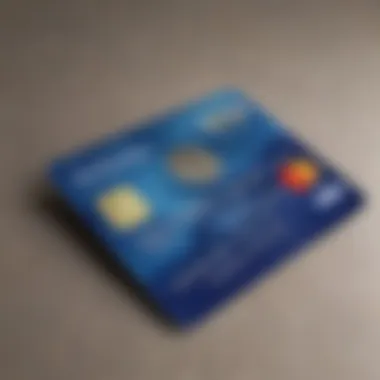Comprehensive Guide to No-Fee Prepaid Visa Cards


Intro
Prepaid Visa cards with no monthly fee are becoming increasingly popular for a variety of reasons. These cards allow users to load a specific amount of money onto the card and use it for purchases. Unlike traditional credit or debit cards, prepaid cards do not offer credit but instead provide a way for users to manage their finances proactively. Individuals from different financial backgrounds can benefit from these cards, including students, young professionals, and families.
Overview of Financial Product
Definition
A prepaid Visa card is a cashless payment solution that allows consumers to load funds onto a card before use. It works like a regular debit or credit card, but users can only spend the amount that they have preloaded. This makes it a secure option for managing expenses, avoiding debt, and making online purchases.
Key Features
- No Credit Checks: Obtaining a prepaid Visa card generally does not require a credit check, making it accessible for those with limited or poor credit history.
- Fixed Spending Limit: Users load a specific amount onto the card, which helps in budgeting effectively. This is helpful in avoiding overspending.
- Wide Acceptance: Prepaid Visa cards can be used at any merchant that accepts Visa, both online and offline.
- No Monthly Fees: Many prepaid cards do not have monthly maintenance fees, which is especially appealing to users looking to minimize costs.
Purpose and Benefits
The primary purpose of prepaid Visa cards is to provide a secure and easy way to handle money without the risk of accruing debt. Some benefits include:
- Budgeting Tool: The fixed load on the card helps users maintain control over their spending. This can be particularly beneficial for students or families managing tight budgets.
- Gifting Option: Prepaid Visa cards make for straightforward gift options, allowing recipients to use the funds as they wish.
- Safety and Security: Prepaid cards often come with features that protect against theft or fraud, making them a safer alternative to carrying cash.
“Prepaid cards serve as a valuable resource for individuals who need to manage their spending while enjoying the convenience of electronic payments.”
Types and Categories
While exploring prepaid Visa cards, it is essential to recognize that they can fall into different categories based on their purpose or features.
Insurance Types
Certain prepaid cards offer additional security or benefits similar to travel insurance. This can include coverage for lost luggage or travel inconvenience.
Loan Types
These cards do not function as a loan product, but they assist those who may not have access to credit in gaining financial independence. By using prepaid cards, individuals can establish a history of responsible spending.
Credit Card Types
Prepaid cards are different from traditional credit cards. They do not contribute to building credit scores, but they can help users avoid debt.
Mortgage Types
Prepaid Visa cards do not apply to mortgages directly but may assist in budgeting for mortgage-related expenses.
Pros and Cons
Pros
- Helps manage spending.
- Encourages savings and planning.
- Reduces the risk of overspending.
Cons
- Limited functionality compared to credit cards.
- No ability to carry a balance for emergencies.
Situational Uses
Prepaid cards can be useful in various situations, including:
- Travel: By loading funds specifically for a trip, individuals can manage travel budgets easily.
- Gifting: Providing a prepaid card as a gift allows for flexible spending choices.
Application Process
Understanding the application process for prepaid Visa cards is vital for interested individuals. Here are the steps involved:
Steps to Apply
- Choose a provider or issuer of prepaid Visa cards that aligns with your needs.
- Visit their website or a physical location to start the application.
- Complete any required forms with personal information.
Eligibility Requirements
Most prepaid Visa cards have minimal eligibility requirements. Typically, applicants must be at least 18 years old and provide valid identification.


Documentation Needed
Necessary documentation usually includes:
- Government-issued ID.
- Address verification.
Common Mistakes to Avoid
- Overloading the card: Loading too much money can lead to loss if the card is lost.
- Ignoring terms of service: Not understanding fees or expiration dates can result in unexpected charges.
Tips for Success
- Research various cards to find the best for your specific needs.
- Keep records of transactions to monitor spending.
Costs and Fees
While many prepaid Visa cards do not have monthly fees, other costs may apply.
Types of Fees Associated
- Activation Fees: Some cards charge a one-time fee upon activation.
- ATM Withdrawal Fees: Using an ATM to withdraw cash from the card may incur fees.
- Replacement Card Fees: If the card is lost or damaged, there may be a charge for a replacement.
Comparisons of Costs Across Options
Comparing these costs with traditional banking options can provide valuable insight into the overall savings of using prepaid cards. Individuals should weigh the advantages against the potential fees to determine the best financial solution for their needs.
Prelude to Prepaid Visa Cards
Prepaid Visa cards are becoming increasingly relevant in today's financial landscape. They offer an alternative for individuals who seek effective ways to manage their spending without incurring monthly fees. This section outlines the key characteristics, benefits, and distinctions that set prepaid Visa cards apart in the broader payment ecosystem.
Definition and Overview
A prepaid Visa card is a payment card that allows users to load a specific amount of money onto it, which can then be used for purchases. Unlike traditional credit and debit cards, which draw from a credit line or a connected bank account, prepaid Visa cards operate solely on the funds loaded by the user. This fundamental aspect encourages responsible spending since the card can only be used until the balance runs out.
Users can acquire these cards from various sources, including online retailers or physical stores. They provide individuals with a means to control their expenses effectively, making them popular among young professionals, families, and students looking for financial tools that promote discipline.
How They Differ from Credit and Debit Cards
Prepaid Visa cards differ from credit and debit cards in several significant ways. Here are a few key distinctions:
- Funding Method: Credit cards allow borrowing on a credit limit, which can lead to debt if not managed properly, while debit cards draw directly from a checking account. Prepaid cards, however, require users to load funds in advance.
- Spending Control: Prepaid cards inherently limit spending to the available balance, promoting healthy spending habits. In contrast, credit cards may tempt overspending, as they offer a line of credit.
- Fees: While some prepaid cards come with certain fees, many do not involve monthly charges, making them an appealing choice for budget-conscious users. Credit cards often have annual fees and interest charges that add to overall costs.
In summary, prepaid Visa cards serve a unique function in personal finance, standing as a more accessible option for those who prefer to manage their finances tightly without the concern of accumulating debt.
Key Features of Prepaid Visa Cards
Prepaid Visa cards are becoming an increasingly popular financial tool because they bridge the gap between cash and traditional banking solutions. There are specific features unique to these cards that cater to various needs, whether for budgeting, gifting, or convenience during travel. Understanding these features is critical to utilizing their full potential. In this section, we will explore three main aspects that define prepaid Visa cards:
No Monthly Fees Explained
One of the most attractive features of prepaid Visa cards is the absence of monthly fees. Unlike traditional bank accounts or credit cards, which often impose recurring charges, prepaid cards allow users to manage their finances without ongoing costs. This makes them favorable for individuals looking to avoid unnecessary expenses.
However, while monthly fees are eliminated, users should still watch for other types of charges, such as transaction fees when using the card, or reload fees if they need to add funds. Understanding this aspect can save users from surprise costs while offering budget control.
Loading and Reloading Options
Prepaid Visa cards offer varied options for loading funds. This flexibility allows users to choose how they want to preload money onto the card. Users have options such as:
- Direct deposit: Many cards allow direct deposit from salaries or government benefits, making it easy for users to access funds.
- Bank transfer: Users can transfer money from their bank accounts to the prepaid card.
- Cash deposits: Selected retailers offer services for loading cash directly onto the card at their locations.
Reloading options also vary widely. Some cards allow for unlimited reloads, while others may impose limits or fees. Knowing these details ensures that users can efficiently manage their finances according to their specific needs.
Spend Control Mechanisms
The spend control mechanisms of prepaid Visa cards are noteworthy. Unlike credit cards, prepaid cards only allow spending up to the available balance. This intrinsic feature encourages better financial discipline, as users cannot overspend beyond what they have loaded onto the card. Additionally, many prepaid cards come with tools to help track spending habits.
Some common spend control mechanisms include:
- Spending limits: Users can set limits on daily or monthly spending, preventing unintentional overdrafts.
- Transaction alerts: Notifications can be set up for each transaction, ensuring that users are aware of their spending.
- Use restrictions: Users may also restrict certain types of transactions, such as online gambling or international purchases.
Adopting these features helps consumers navigate financial responsibilities and enhances overall money management.


The importance of understanding the features of prepaid Visa cards cannot be overstated. They not only influence how users interact with their finances but also how they leverage budgeting and spending effectively.
Applications of Prepaid Visa Cards
Prepaid Visa cards serve various functions in modern financial practices. They cater to different needs, from personal budgeting to travel expenses. Each application offers unique advantages, making these cards a versatile solution for many individuals. Understanding their specific applications helps users maximize their benefits.
Budgeting and Financial Management
Prepaid Visa cards can significantly enhance budgeting strategies. By preloading a specific amount of money, users have a clear limit on their spending. This setup encourages mindful spending habits. Users cannot exceed their balance, reducing the risk of overspending that often comes with traditional credit cards. Families and young professionals can particularly benefit from this approach.
Additionally, many prepaid Visa cards offer tracking features through mobile apps. These tools allow users to monitor their transactions and understand their spending habits better. This insight can help in adjusting financial behavior to meet savings goals. The simplicity of managing finances through a limited balance aligns well with the objectives of effective financial management.
Travel and International Use
Traveling with a prepaid Visa card presents a practical alternative to cash and credit cards. They are accepted widely, providing a sense of security in foreign countries. Users can load their cards with the local currency, eliminating the need for currency exchange and often earning a better exchange rate.
Many prepaid Visa cards also come with lower fees for international transactions. They allow for straightforward budgeting while traveling. Additionally, if a card is lost or stolen, it can be reported and deactivated quickly, ensuring funds are protected. This makes prepaid cards a suitable option for travelers who want control over their spending while exploring new destinations.
Gift Giving and Incentive Programs
Prepaid Visa cards are excellent choices for gift-giving. They provide the recipient with the freedom to choose what they want. Unlike physical gifts, a prepaid card gives a sense of personalization while ensuring utility. It's particularly popular during holidays or special occasions like birthdays.
Moreover, businesses often use prepaid Visa cards as incentives. They can be part of employee reward programs for achievements or performance. Doing this can boost morale and motivate staff. These cards hold inherent value and serve multiple purposes, making them suitable for various scenarios. Organizations should consider this option when crafting incentive programs.
In summary, prepaid Visa cards prove beneficial for budgeting, travel, and gifts. Their unique features adapt to diverse applications, making them a valuable financial tool.
Benefits of Using Prepaid Visa Cards
Prepaid Visa cards offer distinct advantages that can cater to both individuals and families. Unlike traditional banking products, they provide a unique financial management tool. Understanding the benefits of these cards is crucial for those looking to enhance their budgeting strategies without incurring monthly fees. Here, we will explore the key benefits that make prepaid Visa cards an appealing choice.
Financial Discipline
One of the significant benefits of using prepaid Visa cards is the promotion of financial discipline. Since these cards are loaded with a fixed amount of money, users are unable to overspend beyond their available balance. This feature encourages responsible spending habits. In a world where credit cards can lead to unmanageable debt, prepaid cards serve as a practical alternative.
For example, young professionals can set a monthly budget for discretionary spending, such as entertainment or dining out. By loading only a specified amount onto the card, they can make informed choices about their finances. This structured spending approach directly contributes to better financial habits, reducing the tendency to make impulsive purchases.
Widespread Acceptance
Prepaid Visa cards are widely accepted by merchants around the globe. They function similarly to credit and debit cards. You can use them at retail stores, restaurants, and online platforms without any hassle. This makes them practical for various users, including traveling individuals or students studying abroad.
With a prepaid card in hand, there’s flexibility. Users often feel secure knowing they can access their funds in most places. Moreover, these cards are backed by Visa, ensuring a level of trust and reliability. In situations where cash is not feasible, these cards become essential financial tools.
- Accepted at millions of locations worldwide
- Useful for online purchases
- Can be a safe alternative to cash
Enhanced Security Features
Security is another significant advantage of prepaid Visa cards. They offer protections that cash does not, reducing the risk of theft or loss. If a card is lost or stolen, users can report it and often recover their funds, unlike cash that cannot be replaced.
Many prepaid cards come with added security features. For instance, transactions usually require a PIN, providing an additional layer of protection. Some providers also offer mobile apps that allow for real-time transaction monitoring. This means users can immediately notice any unauthorized activities and take necessary actions. This proactive stance enhances overall financial security.
Conclusion:
Using prepaid Visa cards offers numerous benefits, making them practical for a wide range of users. They foster financial discipline, offer widespread acceptance, and enhance security—three advantages that underscore their value in today's financial landscape. Understanding these benefits can help individuals and families make informed decisions about their financial management tools.
Limitations of Prepaid Visa Cards
Prepaid Visa cards offer a range of features that can be very beneficial for many users. However, it’s important to recognize their limitations. This understanding allows individuals to make informed decisions regarding their financial choices. Emphasizing these limitations helps in aligning expectations with the realities of using prepaid cards.
Inability to Build Credit History
One of the key aspects of financial health is maintaining a good credit history. Unfortunately, prepaid Visa cards do not contribute to building this history. They operate outside the credit system. Each time a transaction is made, it does not reflect on the user’s credit report. This means, for young professionals, families, or students looking to build or improve their credit scores, using a prepaid card could be counterproductive. While they can be useful for money management, individuals should consider alternative forms of credit if they want to build a history.
Potential Transaction Fees
While many prepaid Visa cards do not charge monthly fees, they can have other costs that users may overlook. Some commonly encountered transaction fees include:
- ATM withdrawal fees
- Reloading fees
- Balance inquiry fees
- Foreign transaction fees
These fees can add up quickly. For example, a student who frequently withdraws cash may find that transaction fees significantly diminish their budget. It is essential for users to read the terms and conditions carefully to understand these potential charges. This practice ensures better financial planning and avoids unexpected costs.
Limited Consumer Protections
Consumer protections are vital for safeguarding against fraud and unauthorized transactions. Unfortunately, prepaid Visa cards typically offer less protection compared to traditional debit and credit cards. For instance:


- Fraud liability may differ, meaning users might be more responsible for unauthorized transactions.
- Dispute resolutions can be limited, complicating attempts to resolve issues.
These limitations combine to create a riskier environment for users who rely heavily on prepaid cards for daily transactions. Understanding these limitations can encourage individuals to assess their choices more critically. Users might find it valuable to explore other financial products that offer robust consumer protection.
It's important to be fully aware of the limitations, as they can greatly impact financial decisions and security in daily spending.
Choosing the Right Prepaid Visa Card
Selecting the appropriate prepaid Visa card is crucial for maximizing its potential benefits. This decision impacts budgeting habits, spending control, and overall financial management. Understanding the various features and options available can significantly influence your experience with the card. Not all prepaid cards are created equal, and some may serve your needs better than others based on your financial situation and lifestyle.
Comparative Analysis of Popular Options
When evaluating prepaid Visa cards, a comparative analysis of popular options is essential. Each card comes with distinctive features that can meet different needs. For example, some cards may offer cash back rewards, while others might provide unique perks for travel or online shopping. Consider the following popular prepaid Visa cards:
- NetSpend Visa Prepaid Card: Features reloadable options and budgeting tools. Ideal for those looking to manage spending smartly.
- Walmart MoneyCard: Offers no monthly fees if you meet certain criteria, plus cash back on purchases at Walmart. Particularly effective for regular Walmart shoppers.
- PayPal Prepaid Mastercard: Allows seamless online transactions and comes with early direct deposit features. Good for those who frequently use PayPal.
These variations require careful consideration based on your financial habits and preferences. Ultimately, your choice should align with your financial goals and usage habits.
Evaluating Fees and Charges
Understanding fees is a vital component when selecting a prepaid Visa card. While many options claim to have no monthly fees, one must examine the overall cost structure.
Look for the following fee categories:
- Loading Fees: Many cards charge fees to load cash onto the card.
- ATM Withdrawal Fees: Using ATMs outside the network can incur charges.
- Transaction Fees: Some transactions, especially international ones, may lead to additional costs.
Make sure you evaluate these fees accurately. Comparing them can help you pick the card that best fits your budget, without unexpected expenses.
Reading the Fine Print
Reading the fine print is often overlooked when choosing a prepaid Visa card, but it's essential. Small details could have significant implications for your experience.
- Terms and Conditions: Understand the card's usage guidelines, including restrictions on where you can spend it.
- Expiration Dates: Some prepaid cards may expire after a certain period if not used.
- Customer Support: Review the available customer support options, as you may need assistance in specific situations.
Overall, a thorough investigation into the fine print can reveal hidden fees, restrictions, and customer service expectations that could impact your use of the card.
It's not only about picking a card; it's about choosing smartly to fit your lifestyle and financial goals.
Alternatives to Prepaid Visa Cards
Exploring alternatives to prepaid Visa cards is crucial in understanding the broader financial landscape. Prepaid cards may not meet everyone's needs. This section covers various options such as traditional accounts, other payment solutions, and cryptocurrency wallets. Each alternative has its specific elements, benefits, and considerations.
Traditional Checking and Savings Accounts
Traditional checking and savings accounts offer a fundamental difference from prepaid Visa cards. With a checking account, users typically have unlimited transactions, which is beneficial for everyday banking. Savings accounts often yield interest on deposits, serving as a tool for growing savings over time.
- Accessibility: These accounts provide easy access to funds through ATMs, checks, and online banking.
- Security: Funds in these accounts are often insured by the FDIC, providing peace of mind for depositors.
- Credit Building: Unlike prepaid cards, maintaining a checking or savings account can positively impact one's credit history, particularly if overdraft protection is included.
However, traditional accounts often come with monthly fees, minimum balance requirements, and transaction limits which might deter some customers from using them.
Alternative Payment Solutions
The financial market has introduced various alternative payment solutions that can serve as substitutes for prepaid Visa cards. Some of the notable options include mobile wallets and peer-to-peer payment systems. These solutions hold unique advantages:
- Convenience: Users can pay via their smartphones without carrying physical cards.
- Real-time Transfers: Many apps like Venmo or Cash App allow instant fund transfers between users, which can be more efficient than using prepaid cards.
- No Upfront Costs: Most mobile wallet services do not have upfront fees, making them appealing for casual users.
Yet, it is essential to review the terms of service. Some alternative solutions may have hidden fees or restrictions on transactions that could affect their overall value.
Cryptocurrency Wallets
Cryptocurrency wallets present a different approach to the concept of financial management. They allow users to store and transact digital currencies such as Bitcoin or Ethereum. Here are several aspects to consider with cryptocurrency wallets:
- Decentralization: Users control their funds more directly compared to traditional banks.
- Anonymity: Many cryptocurrencies can offer more privacy in transactions than conventional banking options.
- Potential for Growth: As digital currencies fluctuate, there might be an opportunity for significant returns, unlike standard prepaid card options.
However, there are notable risks involved with cryptocurrency, including market volatility and a lack of regulatory protections. Users must conduct thorough research to understand their options and risks.
Epilogue
In this article, the understanding of the prepaid Visa card with no monthly fee has been explored thoroughly. These cards offer a unique financial tool for individuals seeking control over their spending without the burden of monthly charges. The key element discussed is the flexibility they provide and how they can cater to diverse financial needs.
Recap of Key Insights
- Functionality: Prepaid Visa cards function similarly to debit cards but do not require a bank account. They allow users to load a set amount of money, making it simpler to manage budgets.
- Benefits: The absence of monthly fees makes these cards appealing. They provide a straightforward way to spend money without unexpected costs.
- Considerations: It's important for users to consider potential transaction fees and limited consumer protections. A well-informed choice can lead to enhanced financial discipline.
- Comparison with Alternatives: When evaluating alternatives such as traditional checking accounts or cryptocurrency wallets, prepaid Visa cards stand out due to their ease of use and widespread acceptance.
Final Thoughts on Usage
Using a prepaid Visa card without monthly fees requires informed decision-making. It is not just about having a card, but about understanding its features and limitations. Keeping track of spending can help in maintaining a clear financial outlook. Many young professionals, families, and students could find this tool beneficial, especially when budgeting for specific goals.



